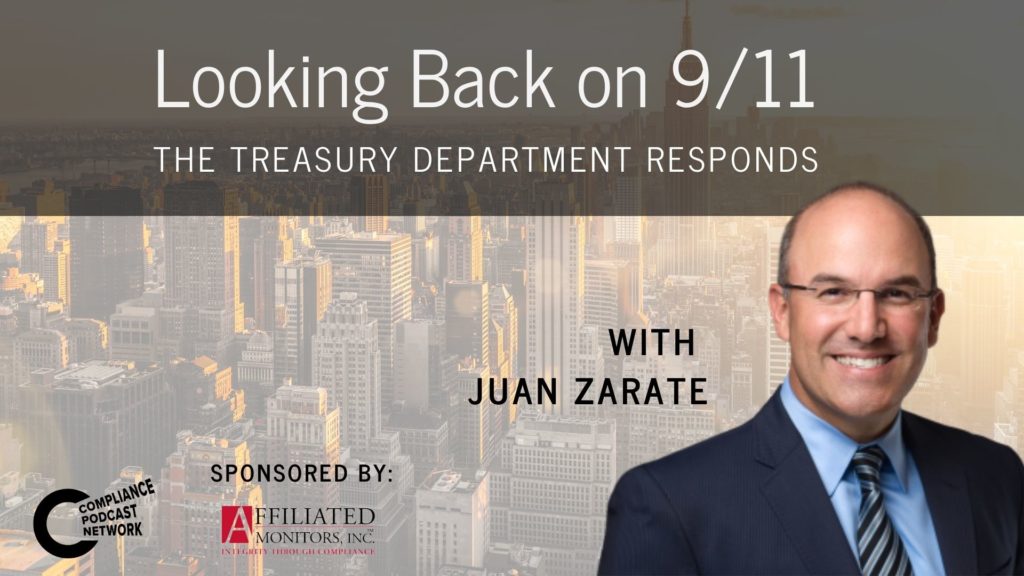Back from summer vacation, Brian and Tim welcome guest Michael Griffiths of Global Investigations Review (GIR) to discuss his recent survey of U.S. trade practitioners, who were asked to identify the most influential OFAC and BIS enforcement actions of the past few years. Then, Brian and Tim focus on the top story of the past month, Afghanistan, to forecast what U.S. sanctions policy may look like in the face of Taliban rule and what measures the U.S. may take to avoid a full blown humanitarian crisis.
Subscribe * Apple Podcasts * Spotify * Amazon Music * Google Podcasts * Stitcher
Questions? Contact us at podcasts@milchev.com.
EMBARGOED! is not intended and cannot be relied on as legal advice; the content only reflects the thoughts and opinions of its hosts.
***Stay sanctions free.***
Day: September 7, 2021
The Kitchen takes a closer look at a recent OFAC settlement with First Bank and JC Flowers & Co. in regards to Iran & Syria Sanctions.

In this episode of The Ethics Experts, Nick welcomes David Staker, CEO and president at Plastic Packaging Technologies, LLC, and Daniel Staker, executive vice president and shareholder at Plastic Packaging Technologies, to the show.

Juan Zarate is the Global co-Managing Partner and Chief Strategy Officer at K2 integrity. On 9/11 he was a prosecutor at the Treasury Department working on international enforcement issues, anti money laundering, anti-corruption and anti-terrorist financing. He joins Tom Fox to commemorate the 20th anniversary of 9/11. They discuss how his role changed, the Treasury Department response and what the tragic event means for him.
Listen to the Episode Now:
A Change of Mission
9/11 changed the mission of the Treasury Department. Juan tells Tom, “We went after terrorist financing to try to disrupt and dismantle Al-Qaeda’s terrorist networks and infrastructure, and disrupt how illicit financing was flowing through the international system.” He recalls where he was on the fateful day and how seeing the smoke from the Towers and the Pentagon affected him emotionally. Something very different was happening, he recalls; the country was under attack.
He outlines the strategic, departmental and tactical changes implemented after 9/11 to fight terrorism. The President declared that we were now at war. “The attitude and the strategic direction of the government was [that] we now have to prevent terrorist attacks,” Juan recalls. “We have to disrupt and dismantle terrorist networks. And that led to an entire preventative paradigm for the counter-terrorism approach to the government.” The new mission of the Treasury Department was the following areas, Juan remarks: “How do you use financial information more aggressively? How do we think about the use of tools and authorities that the Treasury has, like sanctions, anti money laundering rules? How do we think about the relationships internationally with central banks, finance ministries? How do we get the world on board to disrupt terrorist financing, to rip these organizations out of the legitimate financial commercial world?” The Patriot Act was one tactical change, among others, that was implemented to achieve the new mission of fighting terrorism.
What 9/11 Means
Tom asks Juan, “What are your reflections now as we come up on the 20th anniversary of the day of 9/11, and really what it meant for America and for you 20 years later?” Juan responds that he has mixed emotions. He thinks about the victims and their families first of all. That day changed history, he says. “It changed the way that the U S government viewed the world. It changed the way that we operated our strategy. And it changed the sense of our vulnerability.” The recent events in Afghanistan make the 20th anniversary even more difficult for Juan. “I have very mixed emotions coming on the 20th anniversary of 9/11,” he concludes, “but I’m very proud of the work that we did. I’m proud of the people I served with and my sympathies go out to the victims and their families.”
Resources
Juan Zarate at K2 Integrity
 This coming Saturday is the 20th anniversary of the attacks upon America on September 11, 2001. Like most Americans, this was the seminal event in the history of our country. I have been thinking a lot about that date and the anniversary; even more so with the fall of Afghanistan and the evacuation from Kabul. I wanted to do something to commemorate this anniversary, so I decided to do a podcast series featuring the personal stories of persons in the compliance field with their thoughts about what the date of 9/11 means to them, how it changed our profession and their thoughts looking back some 20 years later. The lineup for this week is:
This coming Saturday is the 20th anniversary of the attacks upon America on September 11, 2001. Like most Americans, this was the seminal event in the history of our country. I have been thinking a lot about that date and the anniversary; even more so with the fall of Afghanistan and the evacuation from Kabul. I wanted to do something to commemorate this anniversary, so I decided to do a podcast series featuring the personal stories of persons in the compliance field with their thoughts about what the date of 9/11 means to them, how it changed our profession and their thoughts looking back some 20 years later. The lineup for this week is:
- 6 – Gabe Hidalgo
- 7 – Juan Zarate
- 8 – Alex Dill
- 9 – Eric Feldman
- 10 – Scott Moritz
- 11 – John Lee Dumas
Juan Zarate is the Global Co-Managing Partner and Chief Strategy Officer at K2 integrity. On 9/11 he was at the Treasury Department working on international enforcement issues, anti-money laundering (AML), anti-corruption and anti-terrorist financing. Zarate discussed how his role changed, the Treasury Department response and what the tragic event means for him.
On 9/11, Zarate was in his office, which faced south giving him a view right to the Pentagon. Zarate had a TV in his office, obviously watching with horror as to what was happening in New York. He had been a terrorism prosecutor for a number of years at the Department of Justice (DOJ) so was aware of Al Qaeda. “When I looked south across the windows from the office you could see smoke billowing from the Pentagon. From the fourth floor of the Treasury Department, looking out across the river, you could see smoke rising from the Pentagon.” This affected him emotionally; something very different was happening, he recalled; the country was under attack.
Zarate said there were three categories of changes in fighting terrorism after 9/11. They were at the strategic level, departmental level and then the tactical level. He said, “What happened at that point was the government decided that the president decided very clearly we’re now at war. We can’t sit back. We can’t follow these cases after the fact, right? We are not here to just prosecute people. We now have to prevent these attacks from happening” through more proactive measures. “The attitude and the strategic direction of the government was [that] we now have to prevent terrorist attacks,” he recalled. “We have to disrupt and dismantle terrorist networks. And that led to an entire preventative paradigm for the counter-terrorism approach to the government.”
At the departmental level, the new mission of the Treasury Department was, “How do you use financial information more aggressively? How do we think about the use of tools and authorities that the Treasury has, like sanctions, anti-money laundering rules? How do we think about the relationships internationally with central banks, finance ministries? How do we get the world on board to disrupt terrorist financing, to rip these organizations out of the legitimate financial commercial world?”
At the tactical level, there was the passage of the Patriot Act, which broadened and deepened the AML system, and then enabling the international community. There was the creation of the Financial Action Task Force (FATF), which “created new standards for combating terrorist financing, things like dealing with cash couriers and other elements of the financial system, where we needed to make sure that the international community and in particular, the banks and the banking centers were doing everything possible to prevent terrorists from getting into the system.” This was a “wholesale shift that happened over time, but it was pretty quickly as there was a clear mandate from the President to prevent another attack and to do everything, to disrupt and dismantle terrorist networks.”
There were other areas in this tactical level. Zarate discussed the Executive Orders that came out, the list of terrorists, terrorist organizations, organizations supporting terrorism that came from the US. There were regulations specifying Bank Secrecy Act (BSA) regulations which came from OFAC and later FinCEN. Zarate said the ATF had a role as well as Federal Air Marshalls. He concluded, “there was an entire range of things, we were doing tactically and legally to try to amplify what we were doing from a US government and a Treasury perspective.”
I asked Juan, “What are your reflections now as we come up on the 20th anniversary of the day of 9/11, and really what it meant for America and for you 20 years later?” He responded that he has mixed emotions. He thinks about the victims and their families first of all. That day changed history. “It changed the way that the US government viewed the world. It changed the way that we operated our strategy. And it changed the sense of our vulnerability.” The recent events in Afghanistan make the 20th anniversary even more difficult for Juan. “I have very mixed emotions coming on the 20th anniversary of 9/11,” he concluded, “but I’m very proud of the work that we did. I’m proud of the people I served with, and my sympathies go out to the victims and their families.”
Join us tomorrow when Professor Alexander Dill reflects on being in Manhattan, in the financial district, on 9/11 and the changes brought by the Patriot Act.
Please check out each of the podcasts this week. They will post at 6 AM CT on the Compliance Podcast Network and JDSupra and midnight on Innovation in Compliance, YouTube, iTunes and Spotify.





